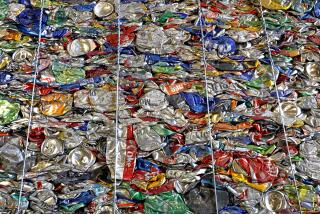Germany’s Recycling Nightmare : Once the Envy of Europe, the Nation’s Program Is Being Buried Under Trash From Diligent Consumers
- Share via
ST. AUGUSTIN, Germany — Agnes Weber had barely left the checkout counter at the giant HUMA department store here when she began rifling through her shopping cart.
The potato sack could stay. So could the soup cans, the toothpaste carton and the vegetable bags. But who needs a cardboard box for a new pair of sneakers?
Weber swerved the cart toward a row of brightly painted recycling bins, and in a flash the box disappeared. “Why bring something home, when I’ll just have to unpack it there?” said the candy factory worker from nearby Bonn.
In a country where environmental correctness has come to rival tidiness and punctuality as a national obsession, determined consumers like Weber have made Germany’s 2-year-old recycling program the envy of Europe.
They have also nearly buried it alive.
German recyclers expect to collect 250,000 more tons of garbage than they can handle this year, a problem that has helped push Duales System Deutschland, the country’s private recycling company, toward bankruptcy. The onslaught has been so overwhelming that the firm is hurriedly erecting huge silos to store the garbage until it can be recycled or shipped out of the country.
“There is just so much more coming in than we can handle,” said Ines Siegler, a spokeswoman for Duales.
The situation has been made more urgent--and embarrassing--by rampant cheating among packaging manufacturers, which have contracts with the nonprofit recycler but have not paid the hundreds of millions of dollars that they owe in fees.
On Tuesday, the crisis claimed its first official victim: Duales’ chief financial officer resigned amid growing pressure from government officials and private waste haulers that someone take responsibility for the fiasco.
The company also announced that it was restructuring its board of directors to make room for representatives from the waste industry, who early this month reluctantly agreed to help bail out the otherwise doomed recycling program. A special shareholders meeting to elect new directors was set for next month.
“We hope this will help solve the problem,” said Siegler.
Germany’s federal government was forced to step in to prevent the system from collapsing and to keep literally tons of garbage from piling up on doorsteps and street corners.
After more than four hours of negotiations with retailers, manufacturers and waste collectors in Bonn, Environment Minister Klaus Toepfer on Sept. 3 unveiled a privately funded bailout plan that he said “ensures a new beginning” for the troubled recycling program.
But critics complained that the plan, which includes new penalties for cheaters and about $533 million in loans from garbage hauling firms, only masks the system’s fundamental problems.
Instead of encouraging Germans to race to the recycling bin with every scrap of garbage, the system should force manufacturers to use less packaging, they said.
“All this has done is make people more wasteful because they think the packaging will be recycled,” said Brigitte Putz, a school secretary buying groceries at HUMA.
“Look at this pizza,” she said, yanking a narrow box from her shopping cart. “This is too much packaging. The industry must change.”
The problem is especially severe with plastic. Last year, German reprocessing companies were able to melt down and reuse about 41,000 tons of plastic--everything from yogurt cups to wrapping. But this year, ever-diligent consumers are expected to collect 10 times that amount.
What cannot be recycled will have to be stored or exported, and both alternatives are opposed by environmentalists.
Klaus-Dieter Feige of the Group 90/Greens, an environmental party in Parliament, said the country’s recycling law should be rewritten to force companies--not consumers--to deal with the problem by eliminating wasteful packaging. “The credibility of the recycling program is no better with these flashy compromises and card tricks,” Feige said.
More than half of the 15,000 packaging companies that use the recycling seal of approval--a green dot with a swirling arrow--have failed to pay all or some of their licensing fees to Duales. The fees range from less than a penny to more than 12 cents per package, depending on size and weight, and are ultimately passed on to consumers through higher prices.
Because of the fraud, residents are recycling far more garbage than Duales can afford to collect. An estimated 90% of all packages, from candy wrappers to television crates, display the green dot, but the company continues to lose $1 million a day. “This has a criminal aspect to it,” said Cay Friemuth, a spokesman for the Environmental Ministry. “Some of these companies are just keeping the money.”
No criminal charges have been filed, but Duales has taken at least three licensees to civil court in an effort to collect delinquent fees, and company officials say more lawsuits are on the way.
Under the bailout agreement, Duales will begin rewriting its contracts with licensees to allow independent inspections of packaging plants. The new enforcement powers are expected to drastically reduce fraud and ensure that “the cow is cared for and not only milked,” said spokeswoman Sieger.
Even so, the ongoing problems have so disillusioned otherwise devoted recyclers that some Germans are threatening the unthinkable: tossing their plastic, paper, metal and glass green-dot packaging into the normal trash.
Outside the HUMA shopping center, Weber, an enthusiastic supporter of recycling, said she and her friends were disheartened that much of their recycling appears to be in vain. If the system doesn’t improve, she said, she will stop separating her garbage.
Helmut, her husband, said he had a better idea. “We’ve already paid for the recycling here in the store, so . . . we’ll just bring the trash back here.”
Shoppers can do just that under Germany’s strict recycling law, which obliges stores to take back throwaway containers of all kinds and return them to manufacturers. Frieda Prasser, a HUMA spokeswoman, said the shopping center already empties its recycling bins six times a day. With 10,000 shoppers daily, the mall would be buried in trash, she said.
It was that vision of Germans hauling their tin cans and milk cartons to the corner store that inspired the current curbside recycling program. After Parliament passed the mandatory recycling law, about 150 companies joined in 1991 to create Duales.
As the company’s problems and bills mount, the federation of German waste haulers--most of whom have not been paid in months--threatened early this month to stop emptying the distinctive yellow recycling bags and bins from front porches and driveways across the country.
The federation then backed off--but only after several cities went to great pains to assure panicked residents that trash would be collected. In Bonn, the city promised to hire students to do the work, if necessary.
More to Read
Sign up for Essential California
The most important California stories and recommendations in your inbox every morning.
You may occasionally receive promotional content from the Los Angeles Times.










